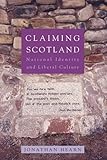Claiming Scotland : National Identity and Liberal Culture / Jonathan Hearn.
Material type: TextPublisher: Edinburgh : Edinburgh University Press, [2022]Copyright date: ©2000Description: 1 online resource (224 p.)Content type:
TextPublisher: Edinburgh : Edinburgh University Press, [2022]Copyright date: ©2000Description: 1 online resource (224 p.)Content type: - 9781902930169
- 9781474469050
- 941.1085 21
- online - DeGruyter
| Item type | Current library | Call number | URL | Status | Notes | Barcode | |
|---|---|---|---|---|---|---|---|
 eBook
eBook
|
Biblioteca "Angelicum" Pont. Univ. S.Tommaso d'Aquino Nuvola online | online - DeGruyter (Browse shelf(Opens below)) | Online access | Not for loan (Accesso limitato) | Accesso per gli utenti autorizzati / Access for authorized users | (dgr)9781474469050 |
Frontmatter -- Contents -- Acknowledgements -- Preface -- Chronology -- Introduction -- Part One: Movement -- Introduction -- Chapter 1. Moral Economy -- Chapter 2. Home Rule History -- Chapter 3. The North'South Divide -- Chapter 4. The Public Sphere -- Part Two: History -- Introduction -- Chapter 5. Kingdom to Nation -- Chapter 6. Liberalism and Empire -- Chapter 7. Welfare State -- Part Three: Culture -- Introduction -- Chapter 8. Egalitarian Myths -- Chapter 9. A Covenanted People -- Chapter 10. Covenant, Contract, Convention -- Conclusion -- References -- Index
restricted access online access with authorization star
http://purl.org/coar/access_right/c_16ec
GBS_insertPreviewButtonPopup('ISBN:9781902930169);In September of 1997 Scots voted overwhelmingly for the establishment of a modern democratic parliament - their first parliament in almost three hundred years. How did this remarkable constitutional change come about? Jonathan Hearn explores this question by examining how claims for greater political autonomy in Scotland today draw on deeper cultural traditions of political thought and action. Scotland's civic nationalism voices a moral critique of neoliberalism and a communitarian defence of the idea of the welfare state, grounding these in Scottish culture and identity. By placing this movement and its language in their institutional, historical and cultural contexts, this powerful book challenges the conventional distinctions between liberalism and nationalism, and between civic and ethnic forms of nationalism, by arguing for a more nuanced way of thinking about processes of culture, identity and politics.Key FeaturesAn anthropological perspective on Scottish nationalismAn ethnographic, highly readable presentation of the subjectA synthetic treatment of nationalism and liberalismAn in-depth critique of the ethnic/civic dichotomy in nationalism studies"
Mode of access: Internet via World Wide Web.
In English.
Description based on online resource; title from PDF title page (publisher's Web site, viewed 29. Jun 2022)


